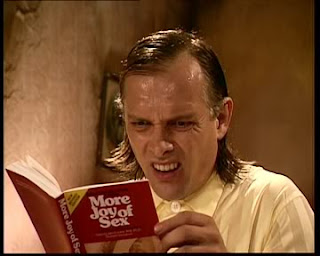 As a year comes to a close, it’s traditional to look back on the its various events and achievements.
As a year comes to a close, it’s traditional to look back on the its various events and achievements.
Being a non-traditional sort, though, I’d just like to take a moment to talk about something which I hope we’ll see the end of when midnight chimes. I don’t want to sound overly negative, but it’d be nice to see this one thing go when the year ends. And that thing is…
People taking offence on behalf of other people.
Actually, I should probably qualify that slightly – it’s more a case of people continuing to take offence (or claiming to, but I’ll get to that in a minute) on behalf of other people, when those others have either said they’re not bothered or they’ve accepted an apology.
The obvious example would be the Daily Mail-led campaign to continue to be shocked and horrified about the prank phone calls to Andrew Sachs, but this year we’ve also seen a fuss about Ben Elton making jokes about the Royal Family; there are probably other examples, but the key thing about all of these events to my mind is the fact that the person who was directly affected by the remarks accepted an apology from the so-called offender (or, in the case of the Elton ‘fuss’, saw the joke, it seems. So it is a bit odd that people who are not directly involved should continue to stoke the fires of outrage, when the one whose feelings could be legitimately stung is moving on and getting over with it.
I suggested above that the people who get all offended about such matters aren’t truly offended, and whilst I don’t feel that’s the case about all such instances, I think a lot of the time the vicarious offendees are taking a slightly odd delight in feeling affronted. I’d been struggling to verbalise why people might want to do this – beyond the fact that, unfortunately, some people seem to take delight in being angry more often than not – but fortunately, a line on an episode of The West Wing I was watching summed it up for me:
DONNA: …they’re shocked and appalled and disappointed but really, they’re none of those things, they just wish they were. So, never miss an opportunity to feel morally superior.
And I think that’s at the heart of it – a lot of the time, these ‘campaigns’ seem to be organised not with the intention of ensuring respect for the monarchy, or … er, that people don’t ring grandfathers and talk about their granddaughters’ sexual activity (not actually one of the biggest blights on society today, I suspect), but more of allowing the person being shocked and horrified to feel that they’re morally superior to the miscreant whose actions they’re so very appalled by.
To use a phrase I’ve written before, I question their sincerity. Yes, many of the jokes that people claim to be so appalled by may not be incisive or sharp, and may well be ill-judged, but they rarely seem to merit the big hoo-hah that follows; a lot of the time, the involvement of newspapers (especially in cases where the BBC can be given a kicking) makes me wonder how much of it is a crusade for social justice, and how much of it is a decision to try to have their paper spearhead a campaign against [whatever] by way of making newsprint seem important and current and relevant in the face of stiff competition from 24-hour news channels and new media.
On a meta- level, you might well ask why I’m so bothered by this when most of the attacks have been on comedians and writers and the like; surely, one might think, it’s paradoxical at best and hypocritical at worst for me to be offended on behalf of these other people. And I might agree, but for the fact that I, and everyone else who spends time watching TV or film or listening to the radio or reading, suffers if we live in an environment in which producers or publishers are constantly examining works in case they offend, they might offend, or someone might take offence at the very possibility that they might offend someone else. Whilst many people are aware of the protests at the time of the release of Monty Python’s Life Of Brian (pictured), it’s all too easy to forget that now, just under thirty years later, it’s seen not only as one of the funniest films ever made, but one of the most insightful about the nature of religion and belief. At the time, it was deeply offensive and shocking and blasphemous, but now it’s held up as being a classic of intelligent humour, and without its creators being able to risk offence those insights (and jokes) would never have been made.
I wouldn’t want to pretend that Frankie Boyle’s joke about the Queen’s ladyparts is likely to be as respected as “You’ve got to think for yourself! You’re all individuals!” in years to come, but an intellectual climate in which material which might possibly offend any portion of the audience has to be excised is a perfect breeding ground for intellectual stagnation, and – ironically – TV schedules full of material which, by its sheer blandness, I find deeply offensive (for example, the currently-on programmes All Star Family Fortunes and All Star Mr And Mrs, whose titles and content differ so wildly I’m surprised Trading Standards haven’t intervened).
In 1990, Salman Rushdie wrote the Hubert Reid Memorial lecture, entitled “Is Nothing Sacred?”; due to his life being threatened for some words he had written on religious matters, Rushdie was in hiding, and so the lecture was delivered by Harold Pinter. In the lecture, Rushdie argues the case for literature being allowed to say things and propose ideas that people might not like, and compares literature to a small room in a large house, in which anything might be said:
“The room is empty, but there are voices in it, voices that seem to be whispering just to you. You recognize some of the voices, others are completely unknown to you. The voices are talking about the house, about everyone in it, about everything that is happening and has happened and should happen. Some of them speak exclusively in obscenities. Some are bitchy. Some are loving. Some are funny. Some are sad. The most interesting voices are all these things at once.”
A similar analogy might be struck for almost any form of media or other means of communication, and whilst I’d strongly urge you to read the entire lecture, if you apply Rushdie’s ‘room model’ to a medium you care about – whether it be film or TV or radio – then the final line of the lecture, even if slightly edited, cannot fail to give pause for thought:
“Wherever in the world the little room […] has been closed, sooner or later the walls have come tumbling down.”
And on that relentlessly cheerful note, this blog bids farewell to 2009 – and, hopefully, to the idea of taking offence, or pretending to take offence, at jokes or comments or ideas, specifically those which relate to another who is notably less concerned by them. I question the sincerity of those who do so on a regular basis, and so perhaps we can close the door (with a hearty slam) on this practice as we leave this year – indeed, this decade.












